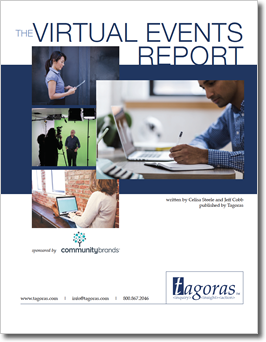Virtual conferences are something we’ve been deeply immersed in for years—both because we’ve done a lot of research and writing about them, such as with The Virtual Events Report—and also because we’ve been practitioners of them with our annual Learning • Technology • DesignTM (LTD) virtual conference, which we recently wrapped up for 2020.
In this episode, we discuss the many compelling reasons of why more learning businesses need to seriously consider making virtual events a serious part of their portfolio of offerings including their related benefits for both organizations and learners.
To tune in, just click below. To make sure you catch all of the future episodes, be sure to subscribe by RSS, Apple Podcasts, Spotify, Stitcher Radio, iHeartRadio, PodBean, or any podcatcher service you may use (e.g., Overcast). And, if you like the podcast, be sure to give it a tweet!
Listen to the Show
Read the Show Notes
[00:18] – In this episode, we revisit a topic that plays an important role in our work which is virtual conferences.

They play a big part because we have done a lot of research and writing about them (see The Virtual Events Report). But also because we are practitioners of virtual conferences. In fact, we’re just wrapping up our own virtual conference, Learning • Technology • DesignTM (LTD), so the topic is really top of mind for us right now.
Often after we complete an event, we’ll complete an After Action Review (AAR). But this time around we aren’t going to do that. Instead we want to talk more generally about virtual conferences because we feel like we are past time for more learning businesses to make them a serious part of their portfolio of offerings.
Below you can check out our past After Action Reviews:
- After Action Review for Learning • Technology • Design™ (LTD) – Part I
- After Action Review for Learning • Technology • Design™ (LTD) – Part II
- After Action Review for 2017 Learning • Technology • Design™ (LTD)
- Mid-Action Review for Learning • Technology • Design™ (LTD)
Reflection Questions

[01:25] – You might consider the reflection questions below on your own after listening to an episode, and/or you might pull the team together, using part or all of the podcast episode for a group discussion.
- Whether as a plan A or plan B, how might a virtual event fit into your portfolio?
- If you’re already offering virtual events, should they become a bigger part of your portfolio?
What we mean by “virtual conference”
[01:46] – We’ll note that when we refer to virtual conferences, they aren’t one-off Webinars. And we use the term to be much broader.
Here’s the definition we use in The Virtual Events report:
A virtual event is a Web-based event that replicates many aspects of a traditional place-based conference, membership meeting, or trade show. It may take place on a standalone basis or in conjunction with a place-based conference (i.e., a “hybrid” event).
Virtual events feature multiple sessions (not just a single Webinar or Webcast) and may include keynote presentations, training and education workshops, discussion areas, social networking opportunities, exhibit areas for vendors, and various other features. Activities in a virtual event may take place in real time (synchronously), on demand (asynchronously), or some combination of the two.
We’ll also note that we tend to use the term virtual event pretty much interchangeably with virtual conference. We also know that other people sometimes prefer to call them online conferences or online events.
Why consider a virtual event now?
[02:59] – A key question for the purposes of this episode is why consider doing one of these now?
We’ve offered a number of reasons before for offering a virtual conference – in fact in episode 135 we went through a few of them.
This time around we want to offer some additional reasons that seem particularly timely right now:
A virtual conference can help you prepare for what could become a necessity.
Think about things like viruses (as of this recording, the coronavirus is making all the headlines) and weather issues. These are just part of the world in which we live and by going virtual, it means that those types of occurrences—illnesses, changes in travel availability, etc.—all of these have much less of a chance of impacting your event.
In fact, Ray Schroeder opened our Learning • Technology • DesignTM virtual conference this year and one of the things he talked about at the outset was the impact of the coronavirus on learning and how organizations that are providing education, professional development, and learning opportunities, need to be prepared and have to be thinking about that.
Again, weather can also be an issue as well and we’ve worked with clients who have had to actually cancel their entire annual event because of flooding, which is becoming much more of an issue these days.
It’s obviously not ideal to totally replace your place-based conference with a virtual conference but to potentially have that as a backup and/or to be adding virtual conferences into your portfolios so you’re not as dependent on that one annual event can be a significant strategic move to make.
[05:12] –
If you have never offered a conference type event before, it tends to be much more viable and a less risky approach to stand up a virtual conference.
Not that it doesn’t take a lot of work, because it definitely does. But you don’t have to deal with food and beverage, the risk of having committed to hotel room blocks, to convince people to travel to your event, etc.
[06:09] –
Virtual conferences open you up to an international audience in a very meaningful way.
People who might not be able or willing to fly halfway around the globe suddenly might be interested in attending something they can attend online without actually leaving their home or office.
In the world we live in today, many people listening may not be thinking of their learning business or organization as an international organization, but that potential is there for every learning business.
If you’re serving a field or industry that has interest around the world – which so many do – by making that conference virtual and making that event accessible via the Web/internet, you are opening yourself up to tap into that potential of being an international organization. So it can really open up new strategic possibilities for you and the leaders of most learning businesses need to be thinking about that these days.
[07:27] –
Going virtual opens up new possibilities for who can lead sessions.
From keynote speakers to practitioners, virtual events allow people to lead sessions eliminating potential barriers such as with scheduling, budget constraints, travel, etc.
And with keynote speakers you might actually be able to get one for your virtual event that you might not ordinarily be able to afford for a face-to-face event.
[10:07] –
Virtual events have so much potential alongside online communities.
We expect to see this really solidify as a trend going forward because launching a virtual event can really be the catalyst for starting or igniting a virtual community.
And vice versa—if you’ve got a good online community going, that can be a fantastic basis for bringing everybody together in a very concentrated way around a virtual event.
We’ve done some of this with Learning • Technology • DesignTM, particularly a couple years ago when we did an extended virtual event where we really focused on community as part of that. But now we’re starting to look at how we extend the community indefinitely beyond the virtual conference. And there’s so much potential there that hasn’t been tapped into yet.
The online community can also be part of how we make real this idea that learning is not an event but a process.
[11:46] –
Virtual events are much more environmentally sustainable
We referenced this in our annual trends Webinar in December 2019 (and related trends podcast episode), but basically a big place-based conference that involves people coming together and flying to get there, creates a huge carbon footprint for that event.
And there’s really no way around that. Even if you’re using biodegradable utensils, you can’t erase those plane emissions.
We’re starting to hear a lot more about this from the events industry with a real effort to try and become more eco-friendly and green. But once you have flying involved, hotels, food and beverage, etc., you’re already heading towards something that is only so sustainable.
Just last month, the United Nations released their latest emissions gap report, which paints a pretty dire picture if we don’t change our behavior, and of course, one of those behaviors that we could change is eliminating or reducing our use of air travel.
We don’t expect place-based conferences/face-to-face meetings to completely go away but it seems inevitable that it’s going to be reduced some, if not significantly, and we need good, viable alternatives to that.
And effective virtual conferences and other types of virtual events are one of the most obvious alternatives to doing that.
[14:04] – A recap of all the potential benefits of virtual conferences.
[17:52] – Wrap-Up
Reflection Questions

- Whether as a plan A or plan B, how might a virtual event fit into your portfolio?
- If you’re already offering virtual events, should they become a bigger part of your portfolio?
If you are getting value from the Leading Learning podcast, be sure to subscribe by RSS, Apple Podcasts, Spotify, Stitcher Radio, iHeartRadio, PodBean, or any podcatcher service you may use (e.g., Overcast).
We’d also appreciate if you give us a rating on Apple Podcasts by going to https://www.leadinglearning.com/apple. We personally appreciate your rating and review, but more importantly reviews and ratings play a big role in helping the podcast show up when people search for content on leading a learning business.
Finally, consider following us and sharing the good word about Leading Learning. You can find us on Twitter, Facebook, and LinkedIn. We also encourage you to use the hashtag #leadinglearning on each of those channels. However you do it, please do follow us and help spread the word about Leading Learning.
[19:44] – Sign off
See Also:


 Self-Evolved Leadership with David McKeown
Self-Evolved Leadership with David McKeown
Leave a Reply